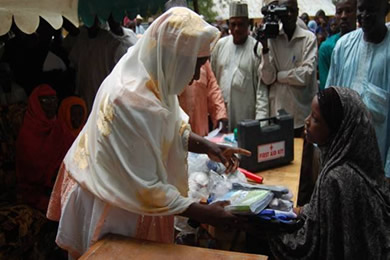Aisha Alhassan and Girls Education in Jigawa
“When I got the items from ESSPIN, I was overjoyed and I want to say a very big thank you to them. I will show them to my parents and will tell them that I want to be a doctor when I grow up and finish school”.
This was the response of an overjoyed Aisha Alhassan, aged 13, one of the 3,000 girls within Jigawa state who have benefited from the ESSPIN Girl Education Initiative (GEI).
Aisha is from Miga LGA in Jigawa state, one of the target local government areas for the GEI. A total of 6000 girls are assisted by the project and ESSPIN is ensuring these girls not only enrol in school but also complete their basic education.
A committee has been established to ensure that the funds for the GEI project are used judiciously and that the girls stay in school. The committee came up with a five point agenda including the provision of training for gender coordinators and officers from the three project LGAs, and the supply of school uniforms to girls whose parents cannot afford them and hence keep their daughters at home.
ESSPIN is helping resource pilot schools with educational materials, water and sanitation and better buildings. This will demonstrate what can be done using the state’s resources.
The agenda also includes the supply of teaching aids to selected schools, health support and then a media engagement strategy. All of these efforts are being put in place to ensure gender equality in accessing basic education, especially in the most disadvantaged areas of the state.
Aisha and other girls were given school uniforms, sandals and books at the launch of the project in Miga. Their progress through school will be monitored over the coming months.
“I and my friends will stay in school and make sure we finish our studies” says an excited Aisha.

One of the beneficiaries of the Girls Education Initiative Project presented with school uniforms and books at Miga Local government